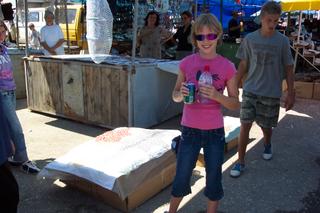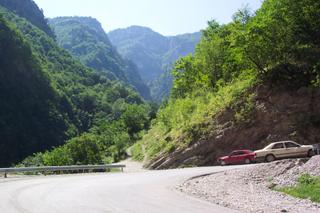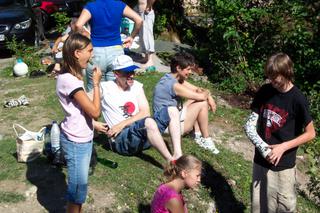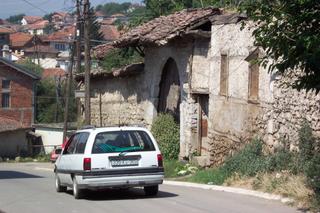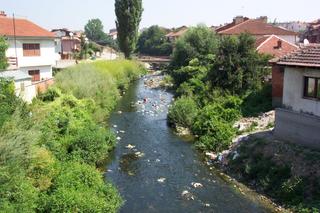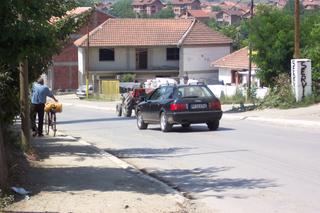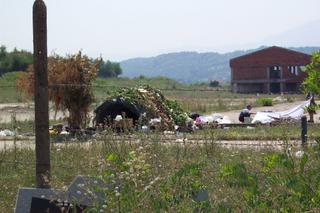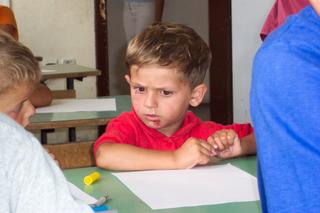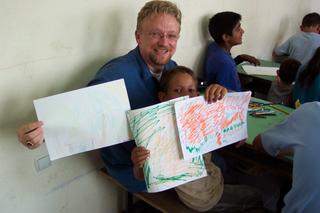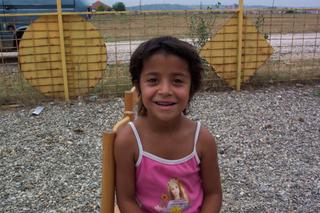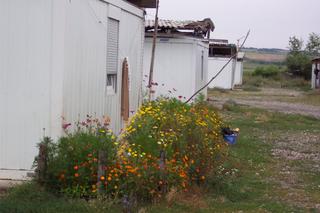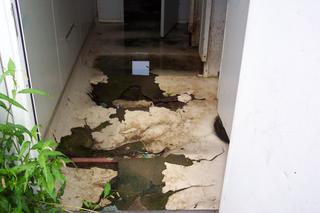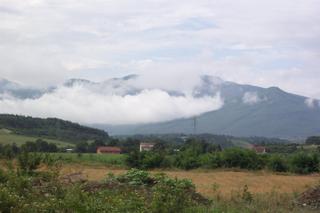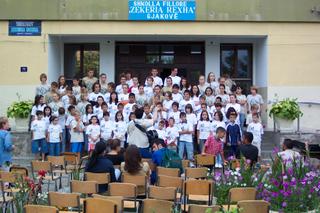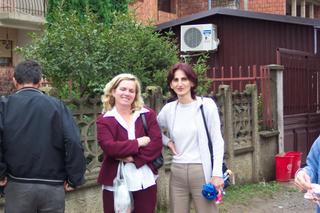Muscatine Kosovo Project
In 2003 the Muscatine (Iowa) Children’s and Youth Choirs initiated an exchange program with youth in war-torn Gjakovë, Kosovo. The Kosovar youth participate in the Kosovo Children’s Music Initiative, which is sponsored by the Shropshire Music Foundation. In 2004, 12 youths from Gjakovë spent two weeks in and around Muscatine. On July 25, 2005, 32 Muscatine residents including choir members departed for a two-week journey to Gjakovë, Kosovo. This is our story.
Thursday, September 01, 2005
Wednesday, August 31, 2005
Post-trip Thoughts from Neva Baker
I have been asked a number of times, “Was it what you expected?” Well, like most experiences, yes and no. I am not a world traveler like Keith and Kristin, or Anne Olson or Doreen Borde. My experience with Europe was 20 and 22 years ago, but I stayed and traveled and studied and lived there for nine weeks each time, and I found that even after so many years, I could understand much of the cultural context – for example, the housing styles didn’t seem so exotic to me as they did to some of the others in our group, especially the kids. We had been warned that it was a third world country, but I still expected Europe, just a poor Europe, and I found that I was mostly right. I had read and studied the books about the ethnic cleansing by Slobodon Milosovec, and I expected more evidence of the ravages of war and violence. Instead I saw many new buildings, and contented cows wandering across the road.
I did not expect the evidence of freedom – a very open and personal freedom of the individuals we meant. Kids played in the streets or wandered around the town wherever they wanted and were safe and happy. Men and women did their shopping, visited with friends, and strolled the “boulevard” on Sunday night until the wee hours, admiring their friends’ best clothing and visiting the café’s and boutiques. I know that some of this is a reaction from the fear and imprisonment in their own houses during Milosevec’s reign of terror. I know that many women are not free as we American women expect to be free. I know that some of the families we worked with – even in Liz’s group of volunteers – came from what we would call dysfunctional homes, and some had experienced abuse and violence from family members. I know also, that part of the freedom from tension and violence in Gjakova is due to the lack of any significant ethnic minority presence. And yet, in spite of this, we also experienced the exhilaration of a sense of safety and freedom we don’t usually know. Several of us have remarked on seeing our fairly young children waving to us from a cab, and having no idea where they were coming from, where they were going to, or who they were with – but we laughed and smiled and waved back, and waited to be told about their adventures later, because we felt confident that they were among friends and were perfectly safe. Our kids enjoyed this sense of freedom as well, and we parents have had to remind our kids that once we come back home, they need to resume asking permission to go out, to obey curfew, and to follow all the safety rules necessary in our American society.
I did not expect to be treated like a hero or visiting royalty. In France, or even Germany, if you walk into a store and point to something and speak English, or maybe a word or two of French or German, you may be treated contemptuously. Here, if you walked into a store, pointed to something and held up one or two fingers to indicate quantity, and said even one word of Albanian along with English, everyone rushed to help you. Friends and neighbors who could speak some English would quickly come to the aid of the shopkeepers. Helpful store clerks would punch the price into a calculator and hold it up for you to see the number, since English and Albanian use very different words for numbers, and understanding was difficult if you had to count higher than “3”. Anyone who could speak any English at all would greet us and ask if we were Americans, and beam with pleasure that we had graced their shop. It is not unusual to see Bill Clinton’s picture in a place of prominence in public buildings, since he was the U.S. President who authorized the NATO bombing, and will long be deemed the hero and savior of the Albanian people in Kosova.
I did not expect the juxtaposition of lovely homes and prized possessions kept scrupulously clean, with trash everywhere to be seen in the public places. I did not expect the level of pollution from the open burning of garbage in the middle of the city. I never expected to see “free range” chickens and cows walking openly everywhere in the city. I was startled by seeing horse drawn carts, side by side with late model Mercedes cars and vans, side by side with tractors and bicycles on the same bumpy, pothole filled city streets.
I have also been asked “Why did you go?’ “Did you do any good?” “Was it worth it?” “Did you accomplish what you meant to do?” “Where you able to help people?”, or variations on these themes. These are questions some of us adults asked ourselves while we were there. Most of us went with a real desire to help people. These were people we had some connection to, families of kids we had met and hosted in our own homes, and we knew they had been through a bad time. When we arrived, we did not expect how happy and well adjusted most of these families were. They were showing us their highest level of hospitality, we did not see their needs. We did see the needs in the displaced persons camps, and in the Roma camp, but most places, we went only once. In the Slovene Village camp, we went three times. The first time, everyone was thrilled to see us and the kids were well behaved. We were a novelty and special. The second time, it was more relaxed, but the kids were still fairly well behaved. The evening singing and dancing party was a real highlight. Yet by our third daytime trip, we were no longer a novelty, the kids behaved horribly, and it was clear, to me at least, that we would have to stay in the long term, and develop a complementary program to Liz’s music program, to have any lasting effect.
Some of us adults on the trip expected this to be primarily a working trip, and we felt guilty when the activities were mostly social, or worse, we felt useless when our skills were not needed, and we were not able to help anyone else. Then of course, there is the Midwestern work ethic which compels some of us over extended types to expect to be busy every minute of the day. When I was young, my father used to come home from work and ask us “What have you done to justify your existence today?” Reading a book or visiting with friends was never an acceptable answer. So standing around for an hour and a half waiting for the group to gather to go to the next outing creates tension for some of us beyond what is explainable by our usual need to punch a time clock or record our billable hours.
So – was it worth it? Did we do any good? The longer I am back in the U.S. and back at work, the more emphatically I believe the answer is Yes – absolutely. Ric Smith is fond of saying that they give us more than we give them. At some point I have stopped seeing that as a feel-good saying, and have begun to appreciate its truth. Did we do them any good? Yes. Maybe not due to our own special skills, which they may or may not have needed, but by our very presence. We are Americans, and they are ethnic Albanians in a poor, often forgotten portion of the world, and we cared about them and their needs, and we like them very much as people. Our friendship, our concern, and our presence meant more than any one of us can probably ever appreciate. They understand that none of us, individually, are rich, but we all worked hard to find the resources to visit their homeland. They view us with hope, that we can help them where they need it the most, in providing opportunities for education for their youth.
As for what they did for us, is there anyone who has ever traveled to another country and not come back with a better understanding and appreciation of America? Is there really any greater satisfaction than forming a long term personal relationship with a person or group of people in another country? It was a terrific reminder that the most important thing in life is our relationship with our family and friends; that home is important because it provides all important shelter and serves as an expression of family, beauty and pride. The friendships we formed with the Albanian kids and their families are worth more than any number of English lessons, eye exams or even musical performances. Priceless.
I hope this is not too long. It really is hard to be brief once I get going, and to cull even 18 pictures out of 452 is tough. Every time I go through them, I have to relive the experiences. (NOTE...Photos are in separate message below)
Photos from Niva Baker
Monday, August 29, 2005
Short Movie from Liz
Liz has sent a very short video (three seconds) of the kids in Slovene Village playing...or attempting to play...baseball. It was taken on August 11, 2005.
My husband has posted it to our personal Web site.
You can see the movie via: http://www.machlink.com/~ejohnston/baseball.MOV
NOTE...The movie is in QuickTime format. You will need to have QuickTime installed on your computer to watch the movie. To open, right click on the link above and then click "open" or "open in new window." Be patient, it may take time to download.

